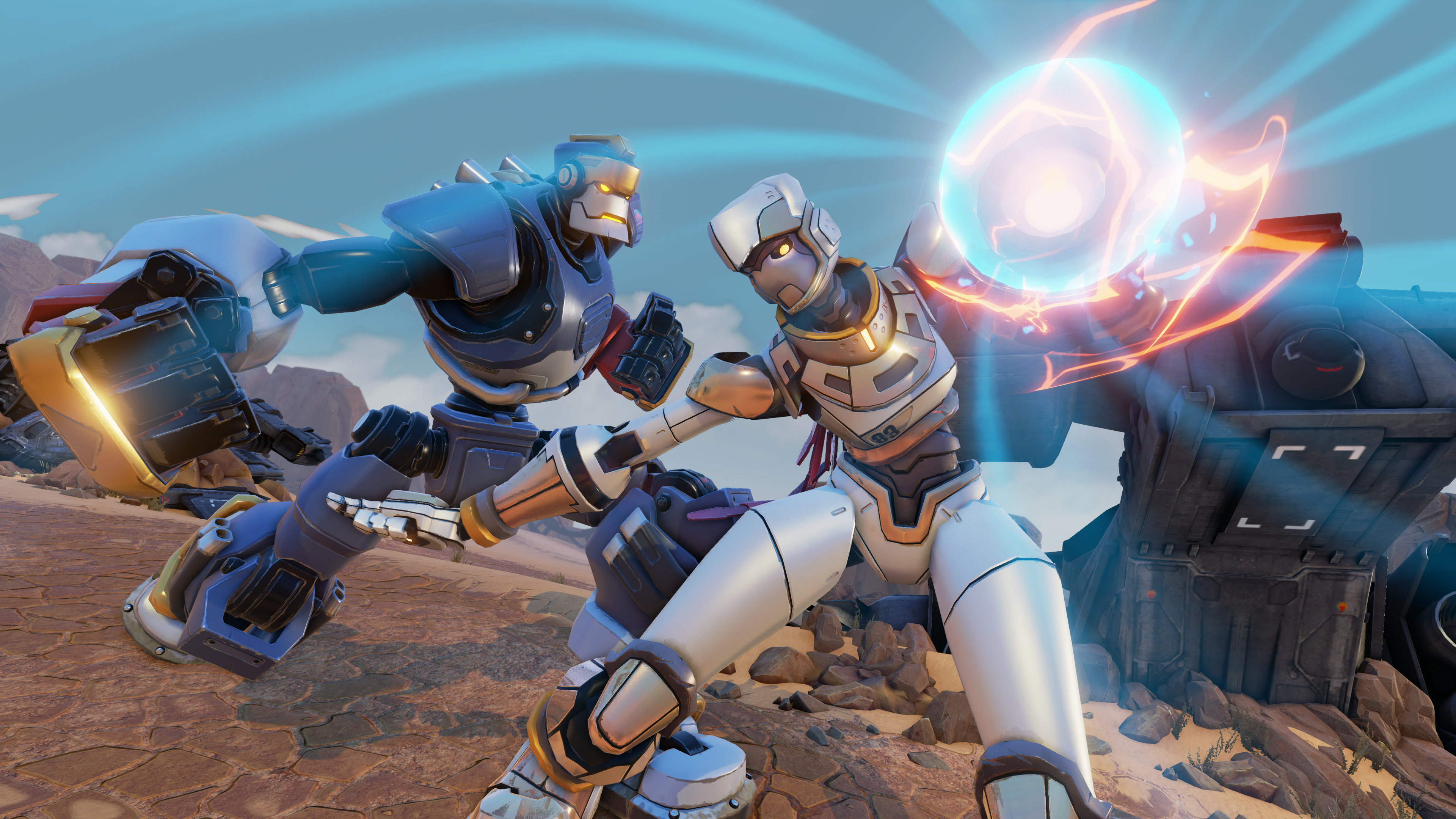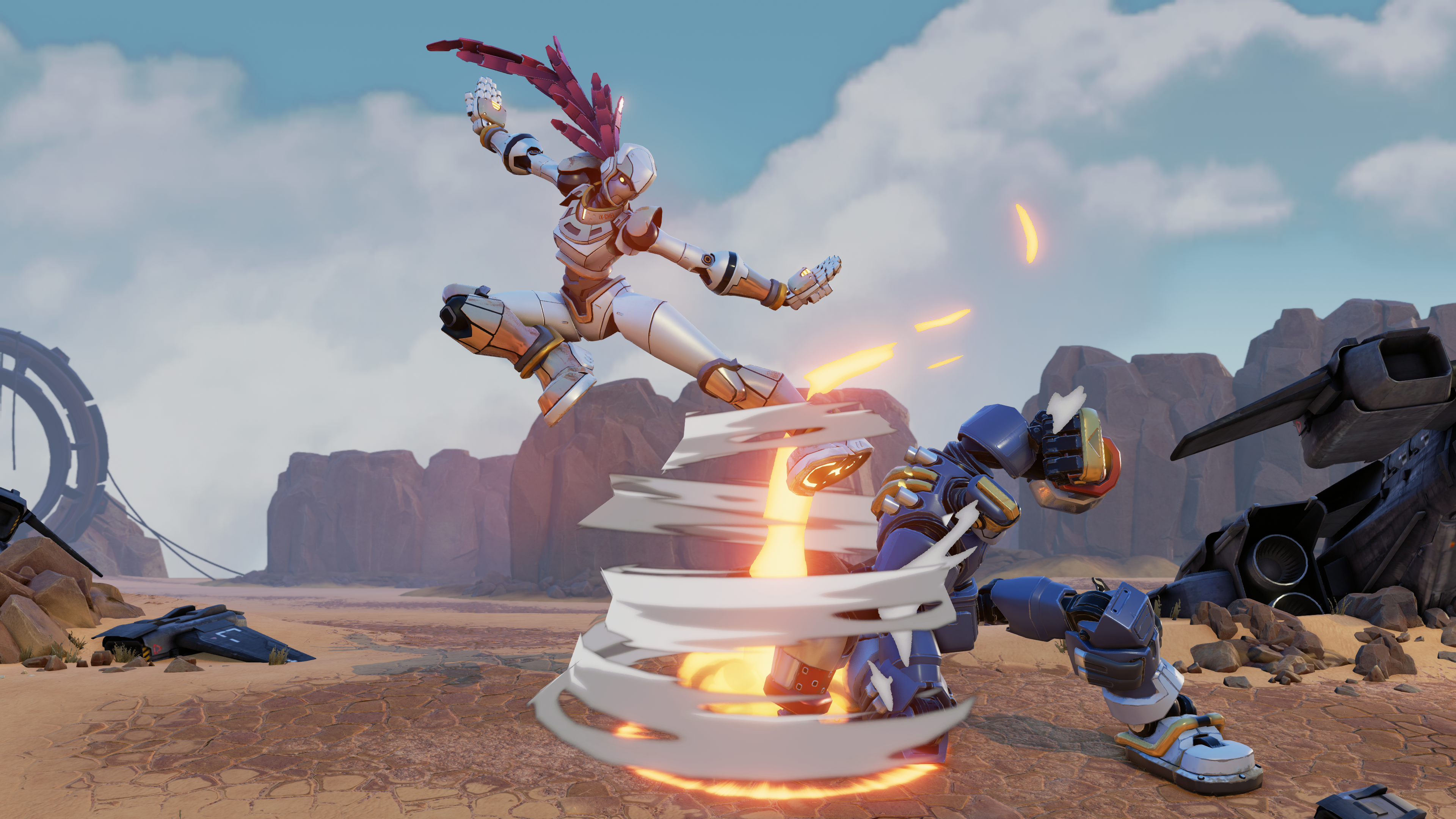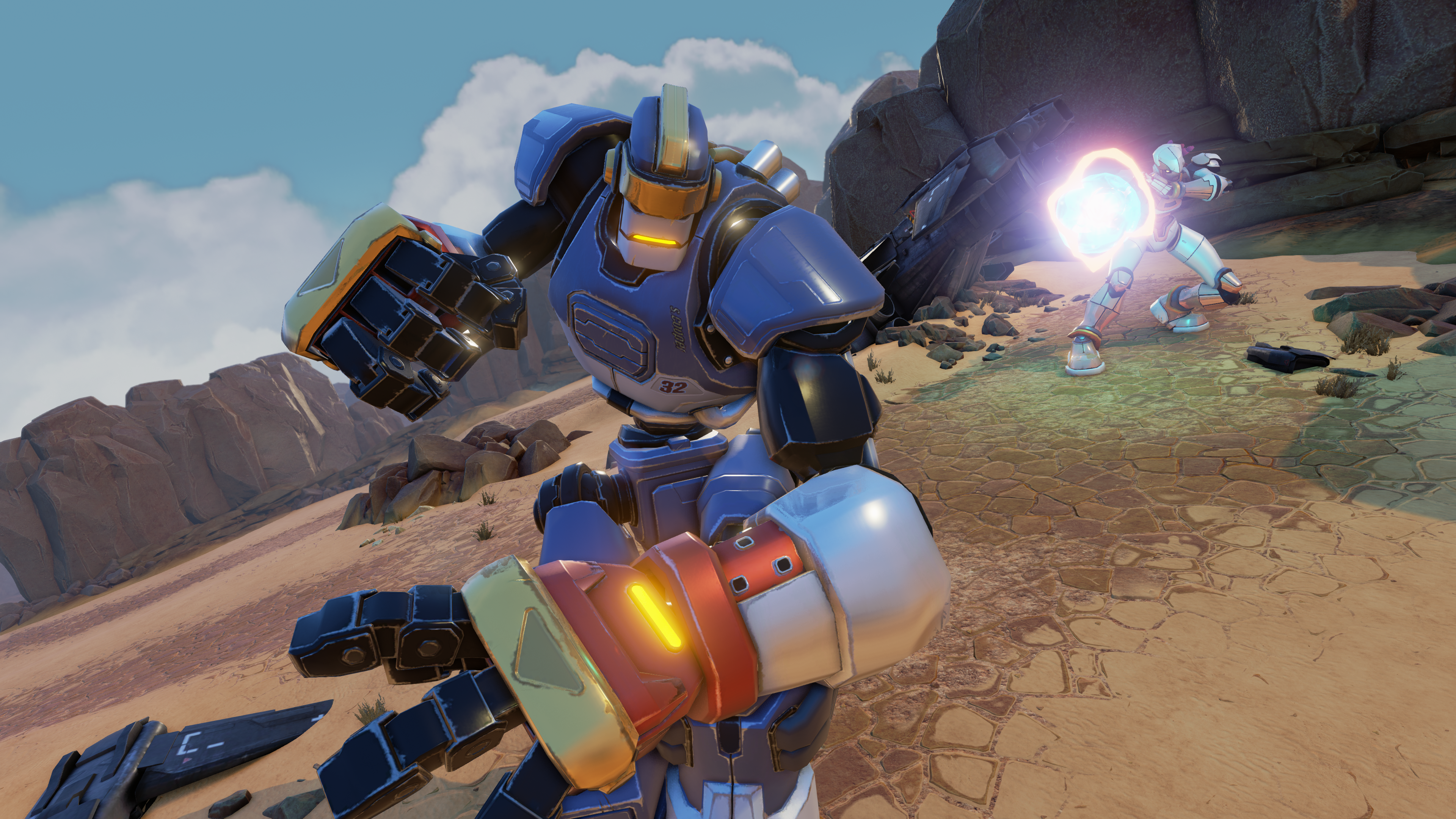Rising Thunder: A PC-only fighting game from experts in the genre

“You almost never jump. This is not actually a bad thing, as most people jump way too much especially when new,” Seth Killian says to me over Twitter direct message, just after he crushed me in a few rounds of Rising Thunder. “But you should still jump sometimes.”
I’ve known Killian for years, but I think this is the most we’ve ever talked about anything. He loves fighting games. In his words, when he came by the office to show me his new game: “I genuinely believe in this shit and I genuinely love it.”
I first met Killian, a Street Fighter expert who’s well-known in the fighting game community, back when he worked at Capcom. He was successful enough there to become the namesake of Street Fighter IV’s final boss, but in 2012 he “started to burn out” and moved on. After spending some time as a game designer at Sony, he returned to the San Francisco Bay Area and started working on a new game with Radiant Entertainment, which was formed by EVO co-founders Tom and Tony Cannon.
I genuinely believe in this shit and I genuinely love it.
While he's showing me Rising Thunder, Killian seems worried I’ll think it’s a bad idea, but it’s exactly what I expected him to show me. I knew he was working on something, and people I’ve known, in and out of the fighting game business, have been saying this for years: why doesn’t someone make an online-focused, free-to-play fighting game? Something like League of Legends or Hearthstone, but for one-on-one fighters? That’s what Killian is making at Radiant, even though its name makes it sound more like a WWII tank sim (I think it's sort of a bad name).
But what's in a name? There are three exciting, core ideas to Rising Thunder: ditch the input barrier for special moves, make it online oriented from the start, and make it free-to-play. They’re all vital to the idea, but the first is the one Killian wants to talk about the most, and arguably the biggest thing to set Rising Thunder apart: it’s a fighting game you can play with a keyboard.
I’ve been playing Rising Thunder for the past couple weeks, with a keyboard, and I’ve even notched a few wins against the developers (they might have been going easy). You could use a controller, or a fightstick, but you don’t need to, as there are no complex inputs. Special moves are activated with one key, and have cooldown timers. The most complex thing you’ll do, input-wise, is jump or double-tap a direction during a move to cancel it for a combo, and be prepared with the correct directional keys and moves to keep it going. It’s like playing a piano, as opposed to Street Fighter’s thumb war.
Half-circles begone
Complex inputs have been baked into fighting games for so long that this is a strangely radical thought: why do you have to do quarter-circles and half-circles and delta motions at all?
The biggest gaming news, reviews and hardware deals
Keep up to date with the most important stories and the best deals, as picked by the PC Gamer team.
“I don’t know if Counter-Strike would be better if, you know, to throw a grenade you had to do a 360 motion with the mouse,” says Killian. “You could make that game, and it would change the game, and that would have impact on gameplay, but does it make it a better game? Not that I can tell.”
I don’t know if Counter-Strike would be better if, you know, to throw a grenade you had to do a 360 motion with the mouse.
Killian wants Rising Thunder to be all about agility and decisions—blocking, jumping, timing, and the mind games of high-level play—and not trying to learn inputs. He tells me he thinks of fighting games as a combination of speed chess and poker, but if you aren’t able to do all the moves reliably, it’s like playing chess while only knowing how to move the pawns and queen. In that case, “we’re not really playing chess,” he says, and no one looks at famous Street Fighter matches and says, “That dude totally threw all the fireballs.” Being able to input attacks isn’t what’s interesting about high-level fighting, the way knowing how to move a knight isn't the hard part of chess.

“[Fighting games] are hard, and that’s not a bad thing—that’s a good thing—but they’re hard in kind of a dumb way,” says Killian. “The core elements of fighting games, like the moves that, when we’re designing games, we build everything around, like fireball, uppercut … that’s not the fancy shit. That’s the ground floor of competitiveness. When we’re building these games, we assume that players are all doing fireballs, uppercuts. There’s not some accommodation made on the design side to be like, ‘Oh, players will only succeed in doing this 20 percent of the time, or 50 percent.’
“You just assume people can do this, [but] put any fighting game kiosk out on a showfloor somewhere and watch people absolutely fail, all day, every day, to actually do the moves we’ve built the whole game around. So the core of the game, the basic elements of the game, are hidden behind an execution wall, and not like a little execution wall, either. To do it, not in the sense that ‘I have technically performed this move,’ but to do it without thinking about it, which is the way you need to be able to do it to really play—that’s like, for some people, a month, because they’re really talented. For most people, more like six months—between three and six months. And in some cases a year—or never—of playing them a lot, before you have the moves.”
After playing Rising Thunder for the past couple weeks (I’ve gone 13-39, but I’m playing against its creators, so give me a break), it doesn’t strike me as a fighting game washed of complexity. As Killian says, it’s got the nuance—though I don’t know it deeply enough to say if it’s more or less nuanced than any other fighting game—without the input barrier. “It’s a completely core fighter, like everything else, it’s just that the special moves don’t involve any weird motions. That’s it. That’s really the only difference. That’s kind of the bet of this whole game.”
My favorite character is Vlad, a big Russian mech piloted by a super-intelligent dog, which Killian tells me is super-intelligent for a dog, but “actually not that smart.” Anyway, he’s a dog piloting a robot, which adorably sits down when you crouch, and he calls himself a “fetch machine,” and I like him. So, I’ve been playing Vlad.
And as Vlad, I’m doing stuff in a fighting game that I’ve typically appreciated from afar, and it feels good. I’m still making a ton of mistakes (hence my win-loss record), but being able to execute moves when I want to rather than worrying about flubbing makes a huge difference to how I view the game. I’m seeing my mistakes for what they are, rather than excusing myself because I screwed up Cammy’s instant cannon strike or whatever I was trying to do. I’m pulling off combos. I’m doing the stuff I practice in training mode in real matches.
Just because I don’t have to learn how to do special moves doesn’t mean I’m instantly good, or that I’m using them at the right times. I’m learning the finer points of blocking and attacking, and I’m getting better. It's still hard, but to be showing notable progress in a fighting game after a few dozen matches is actually pretty unusual.

Free fighter
All I've played of Rising Thunder has been online in an early alpha. Rising Thunder looks like a traditional same-screen fighting game, but it’s not: it’s been designed as an online game from the start. Killian tells me they play on servers in Oklahoma, and they’ve even artificially raised their pings to test it under poor network conditions. They also have Tony Cannon on their side, the guy who pioneered the GGPO netcode, which has been licensed for Killer Instinct and other games.
The reasoning for making Rising Thunder focused on online—so much so that one character has a special move that turns him invisible only on the opponent’s screen—is clear to Killian. Good online play is both the basis for all the biggest competitive PC games and lacking in most fighters. Plus, a healthy matchmaking system might be the invitation to have fun in fighting games that a lot of potential players need. With offline fighters, says Killian, “not only do you have to be a weirdo who survived months of practicing all these moves, you have to have another group of local weirdos who are in the same boat.” And if one of your local players is better than everyone else, everyone else gets crushed. And the worst players are left out.
“If you push [together] all the pressures that are making these games hard to play, there’s a very narrow space … it becomes weird to me how fighting games have survived in spite of all this shit,” says Killian. “And that’s I think a credit to the genre, because it’s a really fucking fun genre.”

Rising Thunder will be free-to-play, also like many of the biggest competitive PC games, but Killian asks if there’s another word—”you know, the good free-to-play”—because the upcoming technical alpha won’t launch with a store at all, and he says the future is all about cosmetic items.
“If you make a fun game, people will play it, and then there will be a business you can build around that selling hats and whatnot,” says Killian. “These are big robots, so I don’t know if hats are necessarily the right direction, but we want our business to be cosmetics, and if that doesn’t work it’s because our game’s not that fun, and we deserve to not win.”
If that doesn’t work it’s because our game’s not that fun, and we deserve to not win.
While profit is obviously a goal, I think, to some degree, Killian just really wants more people to talk about fighting games with. He needs more people to understand why he loves them.
“I’ve talked to people about fighting games for a long time, almost 20 years… but it’s always, there’s a sadness about it, too,” he says. “I’m talking to people and they’re nice people and they’re smart people, but you can see them kind of glaze over at one point, because, I know and they know, ‘Look, I’m not going to really play this fucking game. It might be an amazing game, but this game is really hard, and it takes a ton of time to even do basic shit. I’m not going to put in that time because I’m an adult, or because I play another game, or whatever, and it’s crazy that it takes me this long to learn to basically play it.’ So it’s always sad for me that maybe five percent of the people I talk to are going to have anywhere close to the experience I have with the game.”
Rising Thunder might end that loneliness, if it attracts the audience Killian hopes it will. Signups for the technical alpha are open now, and it'll start rolling out to players on July 28th. I wonder if Rising Thunder can become the Hearthstone of fighting games, which isn't to say that it's simple, just that it's supremely accessible compared to its competition, and free-to-play and set up to encourage long, livestreamed runs toward the top of the ladder.
I think the meta will determine Rising Thunder's fate: to hold more than a passing interest, it needs the kind of depth that inspires daunting wikis and beloved pro players with million-view strategy videos. If that complexity emerges from these characters and systems, the PC will have a real fighting game—one that isn't a console port and that fully embraces the PC and its strengths.

Tyler grew up in Silicon Valley during the '80s and '90s, playing games like Zork and Arkanoid on early PCs. He was later captivated by Myst, SimCity, Civilization, Command & Conquer, all the shooters they call "boomer shooters" now, and PS1 classic Bushido Blade (that's right: he had Bleem!). Tyler joined PC Gamer in 2011, and today he's focused on the site's news coverage. His hobbies include amateur boxing and adding to his 1,200-plus hours in Rocket League.

